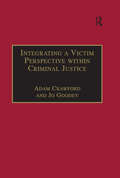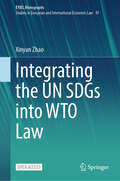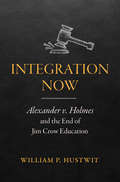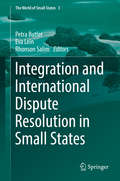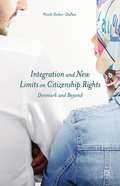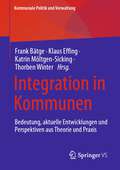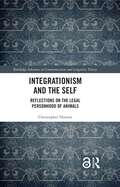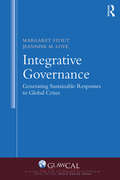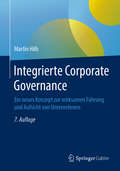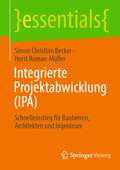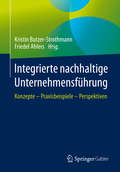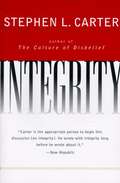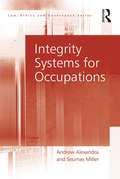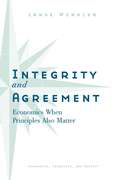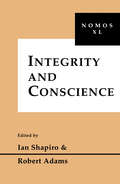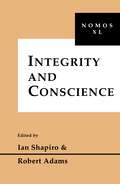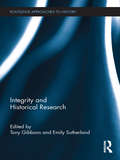- Table View
- List View
Integrating a Victim Perspective within Criminal Justice: International Debates (New Advances in Crime and Social Harm)
by Adam Crawford Jo GoodeyAs numerous academic and political commentators have noted, the implications of introducing a victim’s perspective into the delicate balance between state and offender is likely to be a key issue in the future of criminal justice. This book seeks to outline the contours of the relevant debates drawing together contributions from prominent international and national commentators, from areas including criminology, law, philosophy, social policy, politics and sociology.
Integrating the UN SDGs into WTO Law (European Yearbook of International Economic Law #41)
by Xinyan ZhaoThis is an open access book. Sustainable development is so important that humanity must do its utmost to achieve these goals for the well-being of the present and future generations. WTO members have started to reform WTO rules since the WTO’s Buenos Aires Ministerial Conference in 2017. The book describes a possible bright future for readers: WTO members can integrate the UN SDGs into WTO law (i.e., create sustainable trade rules) by establishing a sustainable development club and constitutionalising the WTO.
Integration Now: Alexander v. Holmes and the End of Jim Crow Education
by William P. HustwitRecovering the history of an often-ignored landmark Supreme Court case, William P. Hustwit assesses the significant role that Alexander v. Holmes (1969) played in integrating the South's public schools. Although Brown v. Board of Education has rightly received the lion's share of historical analysis, its ambiguous language for implementation led to more than a decade of delays and resistance by local and state governments. Alexander v. Holmes required "integration now," and less than a year later, thousands of children were attending integrated schools. Hustwit traces the progression of the Alexander case to show how grassroots activists in Mississippi operated hand in glove with lawyers and judges involved in the litigation. By combining a narrative of the larger legal battle surrounding the case and the story of the local activists who pressed for change, Hustwit offers an innovative, well-researched account of a definitive legal decision that reaches from the cotton fields of Holmes County to the chambers of the Supreme Court in Washington.
Integration Through Law: From Community to Compliance?
by Simon ChestermanIn the past decade, the Association of Southeast Asian Nations (ASEAN) has transformed from a periodic meeting of ministers to setting ambitious goals of becoming a Community by 2015. ASEAN is now the most important regional organisation in the history of the continent of Asia. An important tension in this transformation is the question of whether the 'ASEAN way' - defined by consultation and consensus, rather than enforceable obligations - is consistent with the establishment of a community governed by law. This book examines the growing interest in following through on international commitments, in particular monitoring implementation and compliance. Key barriers remain, in particular the lack of resources and ongoing resistance to accepting binding obligations. It remains to be seen whether these trends herald a more measured approach to decision-making in ASEAN. Written for practitioners and researchers alike, this important book provides the first systematic survey of monitoring within ASEAN.
Integration Through Law: From Treaty-making to Treaty-breaking
by Kuijper, Pieter Jan and Mathis, James H. and Morris-Sharma, Natalie Y. Pieter Jan Kuijper James H. Mathis Morris-Sharma, Natalie Y.From Treaty-Making to Treaty-Breaking is the first high-level analysis of ASEAN's external trade agreements with non-ASEAN states. It clearly sets out the intended, and unintended, consequences of ASEAN's prevailing method of treaty making, with suggested guidelines for the future. The book begins by asking whether ASEAN trade agreements follow worldwide trends in the substantive content of such agreements. It raises questions such as: to what extent is it possible to continue concluding trade agreements through individual member states?; what are the legal consequences - from negotiation and conclusion (treaty-making) through to possible breach of the agreements (treaty-breaking)?; should ASEAN resort to mixed treaty-making? This study does not seek to give a definitive answer to these questions, rather it opens up the topic to readers by suggesting different possible models for ASEAN trade agreements. This thought-provoking book will appeal to anyone interested in trade negotiations and trade agreements, particularly in Asia.
Integration Through Law: Promoting Compliance
by Beckman, Robert and Bernard, Leonardo and Phan, Hao Duy and Hsien-Li, Tan and Yusran, Ranyta Robert Beckman Leonardo Bernard Hao Duy Phan Tan Hsien-Li Ranyta YusranThe reputation and achievement of the ASEAN Community hinges on compliance. This seminal book discusses whether ASEAN's faith in dispute settlement and monitoring mechanisms as a means to better compliance is justified and delves into the extent to which they can facilitate ASEAN Community building. It provides the first comprehensive and systematic analysis of ASEAN's compliance with its instruments, and enables readers to see ASEAN as an organisation increasingly based on law and institutions. Readers will also learn how ASEAN balances a thin line between law and institutions on the one hand and diplomacy and realism on the other. Scholars of adjudicatory mechanisms will find this book a fascinating addition to the literature available, and it will serve as a 'go-to' reference for ASEAN state agencies. The book will also interest academics and practitioners working on comparative and cross-disciplinary studies of dispute settlement, monitoring mechanisms, compliance, and international and regional organisations.
Integration Through Law: The Foundation of the ASEAN Economic Community
by Stefano Inama Sim Edmund W.ASEAN has undertaken the complex task of creating a single economic entity for Southeast Asia by 2015 in the form of the ASEAN Economic Community (AEC), but without regulators or supranational institutions, its implementation has been an inconsistent process. Through comparisons with the EU and NAFTA, this book illustrates the shortcomings of the current system, enabling readers to understand both the potential of regional economic development in ASEAN and its foundational and institutional deficiencies. The authors' analysis of trade in goods and services, investment, and dispute resolution in the AEC indicates that without strong regional institutions, strong dispute resolution or a set of norms, full and effective implementation of the AEC is unlikely to result. The book offers clear solutions for the ASEAN institutions to help the AEC reach its full potential. Written by two leading practitioners, this insightful book will interest policymakers, students and researchers.
Integration Through Law: The Internal Effects of ASEAN External Relations
by Venzke, Ingo and Thio, Li-ann Ingo Venzke Li-Ann ThioStarting with a typology of ASEAN external agreements, the authors go on to provide an original reading of plurilateral agreements as 'joint' agreements. The book then offers both a clarification of the effects - direct or indirect - of external agreements within the legal orders of ASEAN Member States, and an explanation of the effects of external agreements within the legal regime of ASEAN. The authors conclude with a discussion of the role of ASEAN centrality and the role of the secretariat in shaping it.
Integration Through Law: Towards a Rules-Based Community
by Jean-Claude Piris Piris, Jean-Claude and Woon, Walter Walter WoonIn 2007, ASEAN adopted the ASEAN Charter, which stated its ambition to become a 'rules-based' community respecting the rule of law. In order to fulfil this objective, it is vital that the necessary legal infrastructure has effective legal support. This book helps readers to understand the need for and role of such a legal service. To begin with, it explores the way ASEAN and its various institutions have evolved. The current situation with respect to the making of rules and settlement of disputes is then analysed, drawing not only on published primary and secondary materials, but also on the experience of diplomats, officials and legal officers. Finally, the authors draw on their practical experiences, as former attorney-general of an ASEAN member state and former head of the European Council legal service, to make recommendations on how an ASEAN Legal Service might be organised.
Integration and International Dispute Resolution in Small States (The World of Small States #3)
by Petra Butler Eva Lein Rhonson SalimThis book provides an insight into commercial relations between large economies and Small States, the benefits of regional integration, the role of Small States as financial centres as well as B2B and State to State dispute resolution involving Small States. Several contributions allow the reader to familiarise themselves with the general subject matter; others scrutinise the particular issues Small States face when confronted with an international dispute and discuss new and innovative solutions. These solutions range from inventive ideas to help economic growth to appropriate mechanisms of dispute resolution including inter-State dispute resolution and specific areas of arbitration such as tax arbitration. Researchers, policy advisors and practitioners will find a wealth of insights, information and practical ideas in this book.
Integration and New Limits on Citizenship Rights
by Nicole Stokes-DupassIntegration and New Limits on Citizenship Rights is a state-centered analysis of citizenship, immigration and social identity. It explores the increasing role of nation states as critical actors in using social policy to affect the social location of immigrants and ethnics and also to redefine what it means to be a full citizen.
Integration in Kommunen: Bedeutung, aktuelle Entwicklungen und Perspektiven aus Theorie und Praxis (Kommunale Politik und Verwaltung)
by Katrin Möltgen-Sicking Thorben Winter Frank Bätge Klaus EffingDieses Buch greift ein Thema auf, das sowohl für die kommunale Praxis als auch für die Forschung von aktueller Relevanz ist: die Integration in Kommunen. Neben Themen von allgemeiner Bedeutung wird auch die organisatorische Perspektive der Integration in Kommunen behandelt. Die Teilhabe und Partizipation bildet einen weiteren Themenschwerpunkt des Bandes. Nicht zuletzt wird die Integration in der kommunalen Praxis unter verschiedenen Blickwinkeln beleuchtet und diskutiert.
Integrationism and the Self: Reflections on the Legal Personhood of Animals (Routledge Advances in Communication and Linguistic Theory)
by Christopher HuttonIn recent years a set of challenging questions have arisen in relation to the status of animals; their treatment by human beings; their cognitive abilities; and the nature of their feelings, emotions, and capacity for suffering. This ground-breaking book draws from integrational semiology to investigate arguments around the rights of certain animals to be recognized as legal persons, thereby granting them many of the protections enjoyed by humans. In parallel with these debates, the question of the legal personality of artificial intelligence (AI) systems has moved to the forefront of legal debate, with entities such as robots, cyborgs, self-driving cars, and genetically engineered beings under consideration. Integrationism offers a framework within which the wider theoretical and practical issues can be understood. Law requires closure and categorical answers; integrationism is an open-ended form of inquiry that is seen as removed from particular controversies. This book argues that the two domains can be brought together in a challenging and productive synthesis. A much-needed resource to examine the heart of this fascinating debate and a must-read for anyone interested in semiology, linguistics, philosophy, ethics, and law.
Integrative Governance: Generating Sustainable Responses To Global Crises (Global Law and Sustainable Development)
by Margaret Stout Jeannine M. LoveDominant governance theories are drawn primarily from Euro-American sources, including emergent theories of network and collaborative governance. The authors contest this narrow view and seek a more globally inclusive and transdisciplinary perspective, arguing such an approach is more fruitful in addressing the wicked problems of sustainability—including social, economic, and environmental crises. This book thus offers and affirms an innovative governance approach that may hold more promise as a "universal" framework that is not colonizing in nature due to its grounding in relational process assumptions and practices. Using a comprehensive Governance Typology that encompasses ontological assumptions, psychosocial theory, epistemological concepts, belief systems, ethical concepts, political theory, economic theory, and administrative theory, the authors delve deeply into underlying philosophical commitments and carry them into practice through an approach they call Integrative Governance. The authors consider ways this approach to radical self-governance is already being implemented in the prefigurative politics of contemporary social movements, and they invite scholars and activists to: imagine governance in contexts of social, economic, and environmental interconnectedness; to use the ideal-type as an evaluative tool against which to measure practice; and to pursue paradigmatic change through collaborative praxis.
Integrierte Corporate Governance: Ein neues Konzept zur wirksamen Führung und Aufsicht von Unternehmen
by Martin HilbIn diesem Buch lernen Sie den innovativen Corporate-Governance-Ansatz kennenMartin Hilb verbindet in diesem Buch die Stärken traditioneller Corporate-Governance-Modelle zu einem integrierten Corporate-Governance-Ansatz. Daraus entwickelt er ein innovatives Konzept zur wirksamen Führung und Aufsicht von Unternehmen. Die in seinem Buch über New Corporate Governance vorgestellten Instrumente hat Hilb selbst entwickelt und anschließend in der Praxis erprobt. Das Werk richtet sich an Unternehmen sowie an Aufsichts- und Verwaltungsräte.Aktuelle Fallstudien und PraxisberichteIn seinem Buch „Integrierte Corporate Governance - Ein neues Konzept zur wirksamen Führung und Aufsicht von Unternehmen“ behandelt Autor Martin Hilb Fragen zu:Boardstrategie und -kooperationAuswahlZusammensetzungBeurteilungHonorierung und Förderung von Board- sowie VorstandsmitgliedernEvaluation von Führungsgremien Aktuelle Fallstudien und Praxisberichte veranschaulichen die vorgestellten Konzepte.
Integrierte Projektabwicklung: Schnelleinstieg für Bauherren, Architekten und Ingenieure (essentials)
by Simon Christian Becker Horst Roman-MüllerDie Integrierte Projektabwicklung (IPA) ist ein neues Verfahren, um insbesondere große komplexe Bauprojekte erfolgreich umzusetzen. In Deutschland noch wenig bekannt, beginnt es sich auch hier zu etablieren. Dieser Schnelleinstieg stellt die IPA und ihren innovativen Denkansatz vor. Dazu gehören eine frühzeitige Einbindung aller wesentlichen Beteiligten, das Prinzip der Einstimmigkeit sowie eine von Respekt und Vertrauen geprägte Projektkultur. Ein neues Vergütungsmodell liefert zusätzlich Anreize zur Kooperation mit dem Ziel, gemeinsam das Beste für das Bauprojekt zu erreichen.
Integrierte nachhaltige Unternehmensführung: Konzepte – Praxisbeispiele – Perspektiven
by Kristin Butzer-Strothmann Friedel AhlersFinden Sie in diesem Werk die richtungsweisenden methodischen Überlegungen des Integrierten Management-Ansatzes für die Umsetzung einer nachhaltigen Unternehmensführung!Die Thematik wird sowohl theoretisch-konzeptionell als auch praxisnah-fallbezogen mit einem intendierten mittelbaren „Brückenschlag“ zwischen beiden Perspektiven beleuchtet. In Teilen der einschlägigen Fachliteratur wird die nachhaltige Unternehmensführung als integrales bzw. integriertes Konzept gekennzeichnet. Der Integrationsfokus sollte sich dabei auf die unterschiedlichen betrieblichen Ebenen und Subsysteme ausrichten. Dem weithin anerkannten St. Galler-Konzept "Integriertes Management" folgend, geht es darum, dass der auf der normativen Ebene postulierte Nachhaltigkeitsgedanke über die Strategie in operative Handlungsvollzüge einfließt und dadurch operationalisiert und für alle Anspruchsgruppen (insbesondere Kunden und Mitarbeiter) konkret erfahrbar wird. Das Konzept „Integriertes Management“ bildet mit seinem metapherhaften Grundverständnis als „Leerstellengerüst für Sinnvolles und Ganzheitliches“ hierzu einen sinnvoll „befüllbaren Rahmen“. Die bewusste Zusammenführung mit diesem Konzept weitet das Integrationsverständnis der Nachhaltigkeit über die konzeptimmanente Verzahnung der konstitutiven Kerntriade (Ökonomie/Ökologie/Soziales) hinaus in alle betrieblichen Subsysteme (Ebenen, Teilfunktionen etc.) hinein.Erfahren Sie von ausgewählten Autorinnen und Autoren aus Forschung und Praxis aufgrund der unterschiedlichen Blickwinkel eine intendierte breitgefächerte Ausleuchtung der Thematik! Die Beiträge werden folgenden fünf Oberkategorien zugeordnet:Teil I: Einführung mit Betonung einer integrierten SichtweiseTeil II: Werteorientierte Grundlagen und Perspektiven Teil III: Exemplarisch dargestellte Objekt- und AnwendungsfelderTeil IV: Branchen- und praxisfallorientierte Beispiele Teil V: Fazit und Ausblick
Integrity
by Stephen L. CarterIn this book, Stephen Carter examines why the virtue of integrity holds such sway over the American political imagination. By weaving together insights from philosophy, theology, history and law, along with examples drawn from current events and a dose of personal experience, Carter offers a vision of integrity that has implications for everything from marriage and politics to professional football. He discusses the difficulties involved in trying to legislate integrity as well as the possibilities for teaching it.
Integrity Systems for Occupations (Law, Ethics And Governance Ser.)
by Seumas Miller Andrew AlexandraAn integrity system is an integrated assemblage of institutional mechanisms, designed to minimize ethical misconduct and promote ethical health in institutions, organizations, occupations and the like. This book analyses, describes and demonstrates the value of well-designed integrity systems for efficient, effective and ethically sustainable practice, in occupational groups in particular. Developing a blueprint for the design of integrity systems which can be tailored to the specific ethical needs of different occupational groups, this book furthers the general project of ethically informed institutional design ('designing-in' ethics). The approach taken reflects the authors' academic background in professional ethics, as well as their extensive experience in the application of ethical theories and perspectives to the problems and challenges encountered by various occupational groups, such as accountants, business people, lawyers, doctors, nurses, social workers, engineers, emergency service workers and police.
Integrity and Agreement: Economics When Principles Also Matter
by Lanse MinklerSocial scientists who treat humans as rational beings driven exclusively by self-interest ignore a key factor shaping human behavior: the influence of moral principles. Starting with the elementary principle "lying is wrong," economic theorist Lanse Minkler examines the ways in which a sense of morality guides real-life decision making. Whether one feels committed to specific or general moral principles, Minkler explains, integrity demands consistently acting on that commitment. Because truthfulness is the most basic moral principle, integrity means honesty. And honesty extends beyond truth-telling. It requires good faith when entering an agreement and then standing by one's word. From this premise, Minkler explores the implications of integrity for contracts between buyers and sellers and understandings between employers and employees. He also finds a role for integrity in an individual's religious vows, an elected official's accountability to constituents, and a community's obligation to human rights. Integrity and Agreement reintroduces morality as a factor for economists, sociologists, psychologists, and political scientists to consider in their efforts to comprehend human behavior.
Integrity and Conscience: Nomos XL (NOMOS - American Society for Political and Legal Philosophy #11)
by Robert Adams Ian ShapiroCan individuals believe that they are acting with integrity, yet in disobedience to the dictates of their conscience? Can they retain fidelity to their conscience while ignoring a sense of what integrity requires? Integrity and conscience are often thought to be closely related, perhaps even different aspects of a single impulse. This timely book supports a different and more complicated view. Acting with integrity and obeying one's conscience might be mutually reinforcing in some settings, but in others they can live in varying degrees of mutual tension. Bringing together prominent scholars of legal theory and political philosophy, the volume addresses both classic ruminations on integrity and conscience by Plato, Hume, and Kant as well as more contemporary examinations of professional ethics and the complex relations among politics, law and personal morality.
Integrity and Conscience: Nomos XL (NOMOS - American Society for Political and Legal Philosophy #11)
by Robert Adams Ian ShapiroCan individuals believe that they are acting with integrity, yet in disobedience to the dictates of their conscience? Can they retain fidelity to their conscience while ignoring a sense of what integrity requires? Integrity and conscience are often thought to be closely related, perhaps even different aspects of a single impulse. This timely book supports a different and more complicated view. Acting with integrity and obeying one's conscience might be mutually reinforcing in some settings, but in others they can live in varying degrees of mutual tension. Bringing together prominent scholars of legal theory and political philosophy, the volume addresses both classic ruminations on integrity and conscience by Plato, Hume, and Kant as well as more contemporary examinations of professional ethics and the complex relations among politics, law and personal morality.
Integrity and Historical Research (Routledge Approaches to History)
by Tony Gibbons Emily SutherlandThere have been serious debates between historians, novelists and filmmakers as to how best present historical narratives. When writers and filmmakers talk of using historical research with integrity, what exactly do they mean? Integrity and Historical Research examines this question in detail. The first chapter discusses the concept of integrity. The chapters that follow reflect on this philosophical treatment in the light of fiction and film that deals with history in a number of ways. How should writers and filmmakers use lives? Can, and may, people who are now dead and who may have lived long ago, be defamed? The authors include academics, historians, social historians, medievalists, oral historians, literary theorists, historical novelists and script writers. They examine the theoretical influences and practical choices that involve and concern writers and filmmakers who rely on historical research. The desire to be accurate may often conflict with the need to produce a work that goes beyond the mere depiction of events in order to excite the interest of readers and to hold that interest. At the same time there is a developing emphasis on historians, to write well in clear, accessible prose, which may involve using the novelists’ techniques. How much license may be given to writers of fiction and filmmakers in their depiction of historical characters and events? This book begins to answer this question, while inviting further discussion.
Integrity and the Virtues of Reason
by Greg ScherkoskeMany people have claimed that integrity requires sticking to one's convictions come what may. Greg Scherkoske challenges this claim, arguing that it creates problems in distinguishing integrity from fanaticism, close-mindedness or mere inertia. Rather, integrity requires sticking to one's convictions to the extent that they are justifiable and likely to be correct. In contrast to traditional views of integrity, Scherkoske contends that it is an epistemic virtue intimately connected to what we know and have reason to believe, rather than an essentially moral virtue connected to our values. He situates integrity in the context of shared cognitive and practical agency and shows that the relationship between integrity and impartial morality is not as antagonistic as many have thought – which has important implications for the 'integrity objection' to impartial moral theories. This original and provocative study will be of great interest to advanced students and scholars of ethics.
Integrity in Business and Management: Cases and Theory (Routledge Studies in Business Ethics)
by Marc Orlitzky Manjit MongaThis book highlights the interconnectedness of integrity with philosophical history, leadership, managerial decision-making, and organizational effectiveness in a wide variety of contexts (e.g., time theft in organizations and family business). Well-known researchers in business ethics from all around the world reframe the literature on integrity in business and management and develop updated and more comprehensive models of integrity. Integrity in Business and Management connects integrity to both ancient thought and the modern philosophy of pragmatism, but also explains how contemporary societal trends may shape the way we think about integrity. The final chapter warns against oversocialized conceptualizations of integrity and argues for a clear differentiation between personal integrity and moral integrity. Aimed at researchers and academics in the fields of business ethics and organizational leadership, Integrity in Business and Management explicates and critiques prior models of managerial integrity in a wide variety of disciplines, covering economics, moral philosophy, business ethics, organizational behavior, sociology, history, and psychology and offers a helpful set of readings in advanced undergraduate and postgraduate courses of business ethics, corporate governance, corporate social responsibility, and leadership to stimulate discussions about personal integrity, moral integrity, and organizational leadership.
